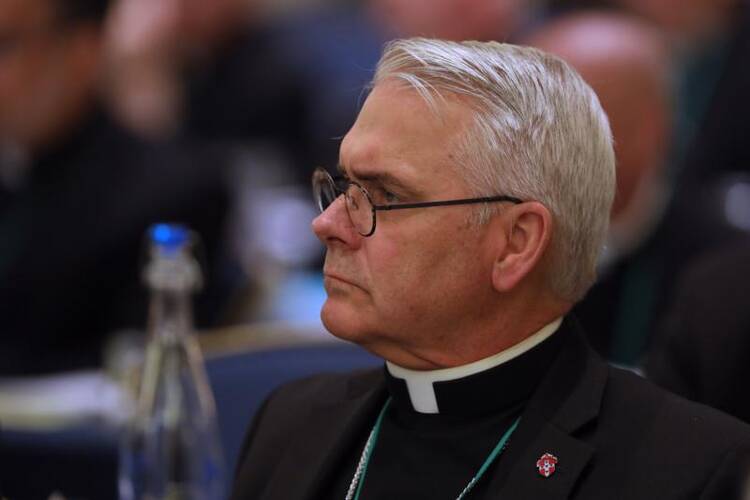WASHINGTON (CNS) -- The coronavirus pandemic is creating fear over limited resources for treating patients, especially the most seriously ill, but "this is not a time to sideline our ethical and moral principles," said the chairmen of three committees of the U.S. Conference of Catholic Bishops.
"It is a time to uphold them ever more strongly, for they will critically assist us in steering through these trying times," said the chairmen of the USCCB's doctrine, pro-life and domestic policy committees in a joint statement April 3.
The statement came in response to recent news reports highlighting policies and practices relating to rationing protocols in response to COVID-19.
"Foremost in our approach to limited resources is to always keep in mind the dignity of each person and our obligation to care for the sick and dying," the prelates said. "Such care, however, will require patients, their families, and medical professionals to work together in weighing the benefits and burdens of care, the needs and safety of everyone, and how to distribute resources in a prudent, just and unbiased way."
The statement was signed by Bishop Kevin C. Rhoades of Fort Wayne-South Bend, Indiana, chairman of the USCCB's Committee on Doctrine; Archbishop Joseph F. Naumann of Kansas City, Kansas, chairman of the Committee on Pro-Life Activities; and Archbishop Paul S. Coakley of Oklahoma City, chairman of the Committee on Domestic Justice and Human Development."
"This pandemic has highlighted the fact that we have limited resources and therefore may be facing some difficult decisions ahead. At all times resources are limited -- there are only so many beds and so many supplies -- but this crisis has and will continue to challenge us greatly," they said. "Every crisis produces fear, and the COVID-19 pandemic is no exception."
Across the country, a critical shortage of personal protective equipment for medical personnel who are treating patients with the highly contagious virus and a lack of equipment such as ventilators has prompted some U.S. hospitals to consider instituting a blanket DNR, or "do not resuscitate" order, for COVID-19 patients despite their wishes or those of their family.
Bishop Rhoades and Archbishops Naumann and Coakley praised hospitals and medical personnel for their courage and compassion in treating the nation's COVID-19 patients.
"Hospitals and health care systems are the true epicenter of this pandemic and our health care professionals -- doctors, nurses, technicians, administrators and support staff -- have all demonstrated courage, compassion, and truly remarkable professional care in a time of growing crisis.
They acknowledged the difficult decisions about care confronting these health care workers, and urged them to read a number of important statements from Catholic health care and medical ethical organizations reminding them -- and the general public -- of ethical and moral principles to be applied in these difficult circumstances.
"The Catholic Health Association of the United States, the Catholic Medical Association, the National Association of Catholic Nurses-USA, and the National Catholic Bioethics Center have all published excellent reminders of these principles and guidelines," they said. "We ask people, especially medical professionals, to read these documents and apply them appropriately in their work."
The statements they cited can be found online at these organizations respective websites: Catholic Health Association, https://www.chausa.org; Catholic Medical Association, https://www.cathmed.org; National Association of Catholic Nurses-USA, https://nacn-usa.org; and National Catholic Bioethics Center, https://www.ncbcenter.org.
Bishop Rhoades and Archbishops Naumann and Coakley also commended the Office of Civil Rights at the U.S. Department of Health and Human Services "for issuing a reminder that in a time of crisis we must not discriminate against persons solely on the basis of disability or age by denying them medical care."
"Good and just stewardship of resources cannot include ignoring those on the periphery of society, but must serve the common good of all, without categorically excluding people based on ability, financial resources, age, immigration status or race," they said.
The prelates added: "With our Holy Father, Pope Francis, the entire church continues to pray for, and offer support to, all those affected by this pandemic."










